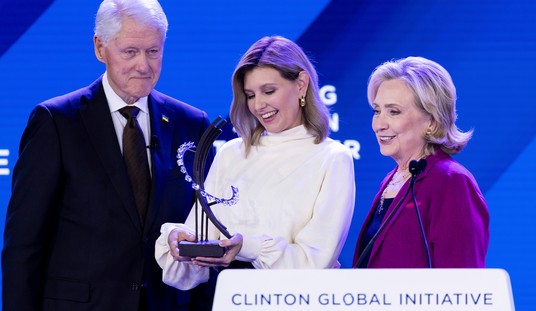Gee, ya think? More than seven months after NPR accepted a grant from Open Society Foundation for its Impact on Government project without naming left-wing activist George Soros as the source, its ombudsperson Alicia Shepard finally got around to addressing the issue of credibility, despite the immediate negative reaction to the decision. Shepard spoke with people inside and out of NPR, most of whom at least worry that the network has set itself up for accusations of coverage bias:
The Open Society grant was announced last Oct. 18 – ironically the same day that then NPR analyst Juan Williams made his infamous remark on Fox News about feeling nervous when he sees Arabs in Muslim garb on airplanes. He was later fired.
The timing was awful, as the poorly handled firing led to a firestorm of criticism from the right – many whom believe NPR caters to a liberal audience and that the government has no business funding public radio.
Yeah, the timing was awful, all right, but both decisions were highly questionable even without the embarrassing juxtaposition. The criticism hasn’t just come from conservatives, either, as Shepard notes. Howard Kurtz blasted NPR for its decision last October when it became public:
No news organization should accept that kind of check from a committed ideologue of any stripe. Even if every journalist hired with the cash from Soros’ foundations is fair and balanced, to coin a phrase, the perception is terrible.
Others within NPR questioned how the organization handled the donation, which didn’t exactly set records for transparency:
“I remember the email announcing the Impact of Government project only mentioned the Open Society Institute,” said one staffer who spoke on the condition of anonymity for obvious reasons. “My cubicle mate immediately said, ‘Isn’t that Soros?’ We Googled to confirm…and were appalled that his name had not been included, as if the company didn’t think it was important or were trying to hide something.”
Imagine that! What else might they be hiding?
Shepard later quotes Media Research Center’s Dan Gainor’s criticism of NPR for taking the money — and tries to draw an equivalence between MRC and NPR:
“NPR took $1.8 million from a man who also spent $27 million trying desperately to unseat President George W. Bush in 2004, yet NPR still claims to be neutral,” said Dan Gainor of the conservative Media Research Center. “Conservatives know that isn’t true. The Soros money just proved it. Will NPR deploy some of that new-found wealth to investigate Soros’ global empire? No, he signs the checks.” [Gainor’s Soros pieces.]
Gainor’s position carries the title of T. Boone Pickens Fellow, and is affiliated with the Media Research Center. Pickens is as well-known on the right as Soros on the left. Wealthy conservatives also fund media groups. In fact, the Franklin Center for Government and Integrity also has a statehouse project that funds reporters to improve state government coverage. The organization is funded by private donations which they do not make public.
Uh, true … and MRC doesn’t purport to be an unbiased source of news, either, with a “firewall” between its funding and its reporting. In fact, in its mission statement, it clearly states that MRC is dedicated to exposing liberal bias in the media in support of conservatives. The Franklin Center is less explicit about its politics, but it also isn’t setting itself up as an independent news organization, and its efforts aren’t funding news outlets. They reach out to “non-profit journalism group[s]” and individual reporters who want training and resources. Shepard sets up these false equivalences to soften the criticism that NPR has earned by taking money from Soros without proper disclosure.
Why did it take Shepard so long to respond to these concerns? She claims that she avoided the subject for months in order to see whether people inside and outside of NPR were concerned about the issue, but it has been a consistent criticism since NPR’s announcement. Why report on it now? Maybe her disclosure will explain it:
Until Wednesday, I was on the board of the Organization of News Ombudsmen, which is an independent group of 60 news ombudsmen in 17 countries. ONO is a cash-strapped group that meets annually to talk about issues unique to the role. It receives money from Soros’ foundation, which this year provided translation in Spanish, English and French at the 2011 conference in Montreal. ONO has a budget of about $30,000 and would welcome money from any group wanting to support media transparency.
Maybe NPR should demonstrate a little more of it first.









Join the conversation as a VIP Member